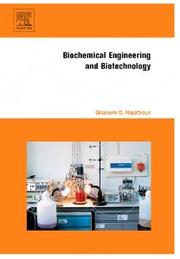| Listing 1 - 10 of 391 | << page >> |
Sort by
|
Book
ISBN: 1283594501 9786613906953 0444595228 0444595252 9780444595225 9780444595256 Year: 2012 Publisher: Amsterdam : Elsevier,
Abstract | Keywords | Export | Availability | Bookmark
 Loading...
Loading...Choose an application
- Reference Manager
- EndNote
- RefWorks (Direct export to RefWorks)
Bioprocess Engineering involves the design and development of equipment and processes for the manufacturing of products such as food, feed, pharmaceuticals, nutraceuticals, chemicals, and polymers and paper from biological materials. It also deals with studying various biotechnological processes. ""Bioprocess Kinetics and Systems Engineering"" first of its kind contains systematic and comprehensive content on bioprocess kinetics, bioprocess systems, sustainability and reaction engineering. Dr. Shijie Liu reviews the relevant fundamentals of chemical kinetics-including batch and conti
Biochemical engineering. --- Biochemical engineering --- Equipment and supplies. --- Bio-process engineering --- Bioprocess engineering --- Biochemistry --- Biotechnology --- Chemical engineering
Book
ISBN: 0444637931 0444637834 9780444637932 9780444637833 Year: 2017 Publisher: Amsterdam Boston
Abstract | Keywords | Export | Availability | Bookmark
 Loading...
Loading...Choose an application
- Reference Manager
- EndNote
- RefWorks (Direct export to RefWorks)
Biochemical engineering. --- Biochemical engineering --- Equipment and supplies. --- Bio-process engineering --- Bioprocess engineering --- Biochemistry --- Biotechnology --- Chemical engineering

ISBN: 1280747277 9786610747276 0080468020 0444528458 Year: 2007 Publisher: Amsterdam ; Oxford : Elsevier,
Abstract | Keywords | Export | Availability | Bookmark
 Loading...
Loading...Choose an application
- Reference Manager
- EndNote
- RefWorks (Direct export to RefWorks)
Extensive application of bioprocesses has generated an expansion in biotechnological knowledge, generated by the application of biochemical engineering to biotechnology. Microorganisms produce alcohols and acetone that are used in industrial processes. The knowledge related to industrial microbiology has been revolutionized by the ability of genetically engineered cells to make many new products. Genetic engineering and gene mounting has been developed to enhance industrial fermentation. Ultimately, these bioprocesses have become a new way of developing commercial products. Biochemi
Biotechnology. --- Biochemical engineering. --- Bio-process engineering --- Bioprocess engineering --- Biochemistry --- Biotechnology --- Chemical engineering --- Genetic engineering
Book
ISBN: 0128179422 0128179414 9780128179420 9780128179413 Year: 2019 Publisher: Duxford, England ; Cambridge, Massachusetts ; Kidlington, England : Woodhead Publishing,
Abstract | Keywords | Export | Availability | Bookmark
 Loading...
Loading...Choose an application
- Reference Manager
- EndNote
- RefWorks (Direct export to RefWorks)
Biochemical engineering. --- Bio-process engineering --- Bioprocess engineering --- Biochemistry --- Biotechnology --- Chemical engineering

ISBN: 1281032778 9786611032777 0080528120 0122208552 Year: 1995 Publisher: London Academic Press
Abstract | Keywords | Export | Availability | Bookmark
 Loading...
Loading...Choose an application
- Reference Manager
- EndNote
- RefWorks (Direct export to RefWorks)
The emergence and refinement of techniques in molecular biology has changed our perceptions of medicine, agriculture and environmental management. Scientific breakthroughs in gene expression, protein engineering and cell fusion are being translated by a strengthening biotechnology industry into revolutionary new products and services. Many a student has been enticed by the promise of biotechnology and the excitement of being near the cutting edge of scientific advancement. However, graduates trained in molecular biology and cell manipulation soon realise that these techniques are only part of
Biochemical engineering. --- Biotechnology. --- Chemical engineering --- Genetic engineering --- Bio-process engineering --- Bioprocess engineering --- Biochemistry --- Biotechnology
Book
ISBN: 0128210125 9780128223833 0128223839 9780128210123 Year: 2020 Publisher: Amsterdam : Elsevier,
Abstract | Keywords | Export | Availability | Bookmark
 Loading...
Loading...Choose an application
- Reference Manager
- EndNote
- RefWorks (Direct export to RefWorks)
Biochemical engineering. --- Bio-process engineering --- Bioprocess engineering --- Biochemistry --- Biotechnology --- Chemical engineering
Book
ISBN: 1627036253 1627036245 Year: 2013 Publisher: Totowa, NJ : Humana Press : Imprint: Humana,
Abstract | Keywords | Export | Availability | Bookmark
 Loading...
Loading...Choose an application
- Reference Manager
- EndNote
- RefWorks (Direct export to RefWorks)
In Synthetic Biology, expert researchers in the field provide the latest developments in molecular biology techniques used in Synthetic Biology. Focusing on computational tools that will aid in systematising the design and construction of parts and systems. Written in the highly successful Methods in Molecular Biology™ series format, chapters include introductions to their respective topics, lists of the necessary materials and reagents, step-by-step, readily reproducible laboratory protocols, and key tips on troubleshooting and avoiding known pitfalls. Authoritative and practical, Synthetic Biology seeks to aid scientists in the further study of developing new biological components and systems.
Biotechnology. --- Biochemical engineering. --- Biochemical Engineering. --- Bio-process engineering --- Bioprocess engineering --- Biochemistry --- Biotechnology --- Chemical engineering --- Genetic engineering
Book
ISBN: 1617799564 1617799556 Year: 2012 Publisher: Totowa, NJ : Humana Press : Imprint: Humana,
Abstract | Keywords | Export | Availability | Bookmark
 Loading...
Loading...Choose an application
- Reference Manager
- EndNote
- RefWorks (Direct export to RefWorks)
Biomass conversion research is a combination of basic science, applied science, and engineering testing and analysis. Conversion science includes the initial treatment (called pre-treatment) of the feedstock to render it more amenable to enzyme action, enzymatic saccharification, and finally product formation by microbiological or chemical processes. In Biomass Conversion: Methods and Protocols, expert researchers in the field detail methods which are now commonly used to study biomass conversion. These methods include Biomass Feedstocks and Cellulose, Plant Cell Wall Degrading Enzymes and Microorganisms, and Lignins and Hemicelluloses. Written in the highly successful Methods in Molecular Biology™ series format, the chapters include the kind of detailed description and implementation advice that is crucial for getting informed, reproducible results in the laboratory.
Biotechnology. --- Biochemical engineering. --- Biochemical Engineering. --- Bio-process engineering --- Bioprocess engineering --- Biochemistry --- Biotechnology --- Chemical engineering --- Genetic engineering
Book
ISBN: 0429104960 1280122579 9786613526434 1439866953 1439866708 1000218740 Year: 2012 Publisher: Boca Raton, FL : CRC Press LLC,
Abstract | Keywords | Export | Availability | Bookmark
 Loading...
Loading...Choose an application
- Reference Manager
- EndNote
- RefWorks (Direct export to RefWorks)
Because of many misconceptions, the biological drug manufacturing industry does not fully utilize disposable components, despite their wide availability. These misconceptions include concerns for the quality of materials, running costs, scalability, the level of automation possible, and the training of staff needed to include these components in existing bioprocessing systems. Not fully realizing the long-term benefits, many manufacturers are unwilling to discard investments made in fixed equipment and traditional stainless steel systems. Regulatory and environmental concerns, however, will ev
Biochemical engineering. --- Bio-process engineering --- Bioprocess engineering --- Biochemistry --- Biotechnology --- Chemical engineering
Book
ISBN: 1624178219 9781624178214 1624178081 9781624178085 Year: 2013 Publisher: New York
Abstract | Keywords | Export | Availability | Bookmark
 Loading...
Loading...Choose an application
- Reference Manager
- EndNote
- RefWorks (Direct export to RefWorks)
Enzymes --- Biochemical engineering. --- Bio-process engineering --- Bioprocess engineering --- Biochemistry --- Biotechnology --- Chemical engineering --- Industrial enzymology --- Industrial applications.
| Listing 1 - 10 of 391 | << page >> |
Sort by
|

 Search
Search Feedback
Feedback About UniCat
About UniCat  Help
Help News
News